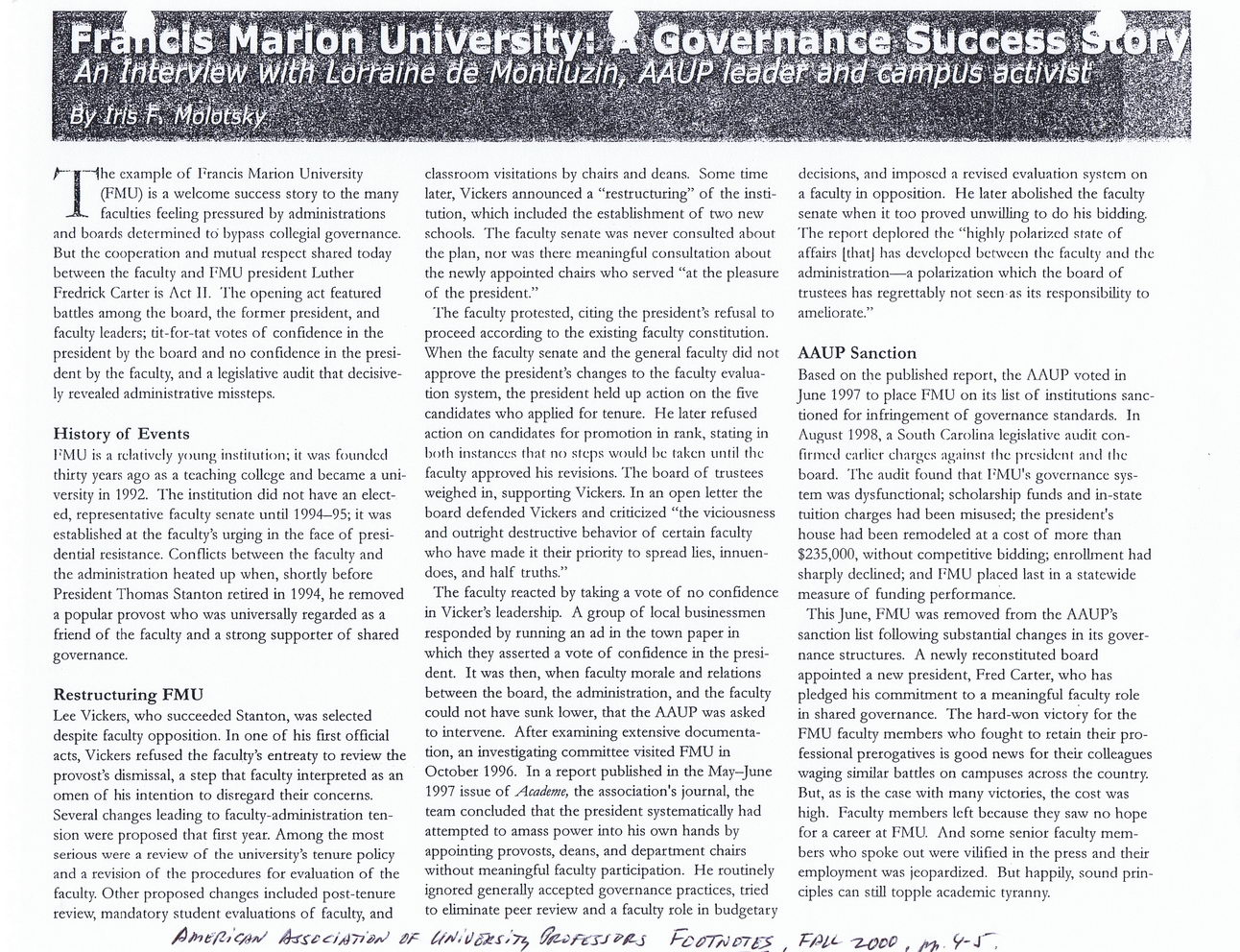This text was obtained via automated optical character recognition.
It has not been edited and may therefore contain several errors.
A"" IT the example of Francis Marion University I (FMU) is a welcome success story to the many JL faculties feeling pressured by administrations and boards determined to bypass collegial governance. But the cooperation and mutual respcct shared today between the faculty and FMU president Luther Fredrick Carter is Act II. The opening act featured battles among the board, the former president, and faculty leaders; tit-for-tat votes of confidence in the president by the board and no confidence in the president by the faculty, and a legislative audit that decisively revealed administrative missteps. History of Events FMU is a relatively young institution; it was founded thirty years ago as a teaching college and became a university in 1992. The institution did not have an elected, representative faculty senate until 1994?95; it was established at the faculty?s urging in the face of presidential resistance. Conflicts between the faculty and the administration heated up when, shortly before President Thomas Stanton retired in 1994, he removed a popular provost who was universally regarded as a friend of the faculty and a strong supporter of shared governance. Restructuring FMU Lee Vickers, who succeeded Stanton, was selected despite faculty opposition. In one of his first official acts, Vickers refused the faculty?s entreaty to review the provost?s dismissal, a step that faculty interpreted as an omen of his intention to disregard their concerns. Several changes leading to faculty-administration tension were proposed that first year. Among the most serious were a review of the university?s tenure policy and a revision of the procedures for evaluation of the faculty. Other proposed changes included post-tenure review, mandatory student evaluations of faculty, and classroom visitations by chairs and deans. Some time later, Vickers announced a ?restructuring? of the institution, which included the establishment of two new schools. The faculty senate was never consulted about the plan, nor was there meaningful consultation about the newly appointed chairs who served ?at the pleasure of the president.? The faculty protested, citing the president?s refusal to proceed according to the existing faculty constitution. When the faculty senate and the general faculty did not approve the president?s changes to the faculty evaluation system, the president held up action on the five candidates who applied for tenure. He later refused action on candidates for promotion in rank, stating in both instances that no steps would be laken until the faculty approved his revisions. The board of trustees weighed in, supporting Vickers. In an open letter the board defended Vickers and criticized ?the viciousness and outright destructive behavior of certain faculty who have made it their priority to spread lies, innuendoes, and half truths.? The faculty reacted by taking a vote of no confidence in Vicker?s leadership. A group of local businessmen responded by running an ad in the town paper in which they asserted a vote of confidence in the president. It was then, when faculty morale and relations between the board, the administration, and the faculty could not have sunk lower, that the AAUP was asked to intervene. After examining extensive documentation, an investigating committee visited FMU in October 1996. In a report published in the May?June 1997 issue of Academe, the association's journal, the team concluded that the president systematically had attempted to amass power into his own hands by appointing provosts, deans, and department chairs without meaningful faculty participation. He routinely ignored generally accepted governance practices, tried to eliminate peer review and a faculty role in budgetary decisions, and imposed a revised evaluation system on a faculty in opposition. He later abolished the faculty senate when it too proved unwilling to do his bidding. The report deplored the ?highly polarized state of affairs [thatj has developed between the faculty and the administration?a polarization which the board of trustees has regrettably not seen as its responsibility to ameliorate.? AAUP Sanction Based on the published report, the AAUP voted in June 1997 to place FMU on its list of institutions sanctioned for infringement of governance standards. In August 1998, a South Carolina legislative audit confirmed earlier charges against (lie president and (he board. The audit found that FMU's governance system was dysfunctional; scholarship funds and in-state tuition charges had been misused; the president's house had been remodeled at a cost of more than $235,000, without competitive bidding; enrollment had sharply declined; and FMU placed last in a statewide measure of funding performance. This June, FMU was removed from the AAUP?s sanction list following substantial changes in its governance structures. A newly reconstituted board appointed a new president, Fred Carter, who has pledged his commitment to a meaningful faculty role in shared governance. The hard-won victory for the FMU faculty members who fought to retain their professional prerogatives is good news for their colleagues waging similar battles on campuses across the country. But, as is the case with many victories, the cost was high. Faculty members left because they saw no hope for a career at FMU. And some senior faculty members who spoke out were vilified in the press and their employment was jeopardized. But happily, sound principles can still topple academic tyranny. '7-000 . y-J",

de Montluzin, Emily Lorraine Color-010